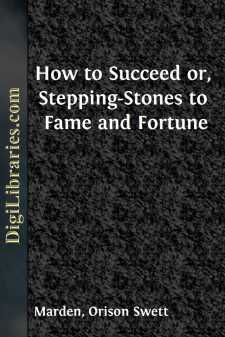Categories
- Antiques & Collectibles 13
- Architecture 36
- Art 48
- Bibles 22
- Biography & Autobiography 813
- Body, Mind & Spirit 142
- Business & Economics 28
- Children's Books 17
- Children's Fiction 14
- Computers 4
- Cooking 94
- Crafts & Hobbies 4
- Drama 346
- Education 46
- Family & Relationships 57
- Fiction 11829
- Games 19
- Gardening 17
- Health & Fitness 34
- History 1377
- House & Home 1
- Humor 147
- Juvenile Fiction 1873
- Juvenile Nonfiction 202
- Language Arts & Disciplines 88
- Law 16
- Literary Collections 686
- Literary Criticism 179
- Mathematics 13
- Medical 41
- Music 40
- Nature 179
- Non-Classifiable 1768
- Performing Arts 7
- Periodicals 1453
- Philosophy 64
- Photography 2
- Poetry 896
- Political Science 203
- Psychology 42
- Reference 154
- Religion 513
- Science 126
- Self-Help 84
- Social Science 81
- Sports & Recreation 34
- Study Aids 3
- Technology & Engineering 59
- Transportation 23
- Travel 463
- True Crime 29
Orison Swett Marden
Orison Swett Marden was an American inspirational author and founder of Success magazine, born in 1848. He wrote extensively on success, personal development, and motivation, drawing from his own experiences of overcoming poverty and adversity. His most famous works include "Pushing to the Front" and "The Miracle of Right Thought," which inspired countless readers with principles of self-reliance and positive thinking. Marden's writings are often credited with shaping the modern self-help movement, influencing figures such as Dale Carnegie and Norman Vincent Peale.
Author's Books:
Sort by:
FOREWORD This revised and greatly enlarged edition of "Pushing to the Front" is the outgrowth of an almost world-wide demand for an extension of the idea which made the original small volume such an ambition-arousing, energizing, inspiring force. It is doubtful whether any other book, outside of the Bible, has been the turning-point in more lives. It has sent thousands of youths, with renewed...
more...
CHEERFULNESS AS A LIFE POWER. I. WHAT VANDERBILT PAID FOR TWELVE LAUGHS. William K. Vanderbilt, when he last visited Constantinople, one day invited Coquelin the elder, so celebrated for his powers as a mimic, who happened to be in the city at the time, to give a private recital on board his yacht, lying in the Bosphorus. Coquelin spoke three of his monologues. A few days afterwards Coquelin received...
more...
CHAPTER I. TRAINING THE WILL. "The education of the will is the object of our existence," says Emerson. Nor is this putting it too strongly, if we take into account the human will in its relations to the divine. This accords with the saying of J. Stuart Mill, that "a character is a completely fashioned will." In respect to mere mundane relations, the development and discipline of...
more...
CHAPTER I. FIRST, BE A MAN. The great need at this hour is manly men. We want no goody-goody piety; we have too much of it. We want men who will do right, though the heavens fall, who believe in God, and who will confess Him. —Rev. W. J. Dawson. All the world cries, Where is the man who will save us? We want a man! Don't look so far for this man. You have him at hand. This man—it is you, it...
more...





